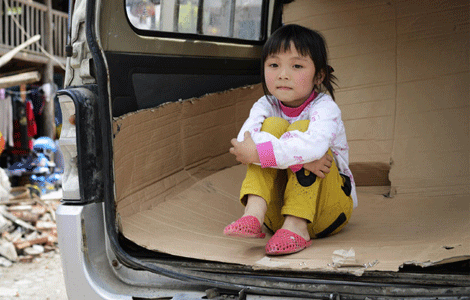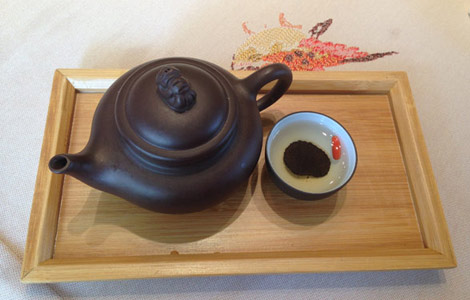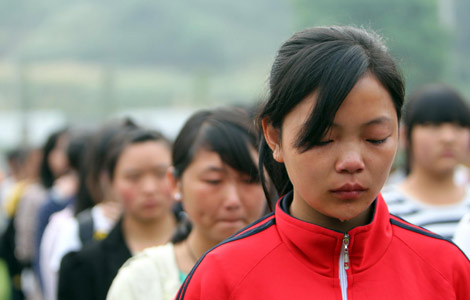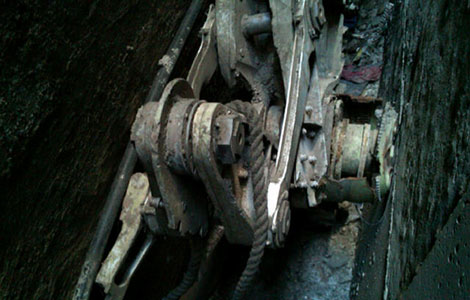Life goes on after tragedy
Updated: 2013-04-28 07:37
By An Baijie (China Daily)
|
||||||||
Those who lost loved ones in the earthquake mourned on Saturday. An Baijie reports in Lushan, Sichuan, that recovery from the disaster is a difficult and painful process.
Li Shaohua shoveled earth on top of two graves on Saturday morning, seven days after his wife and daughter died in the Lushan county earthquake. Li, 46, from Renjia village, Qingren township, Sichuan province, bowed three times to the graves, while his 19-year-old son burned paper offerings to the departed family members.
According to the Chinese tradition of touqi, loved ones should pay their respects to the dead on the seventh day after burial.
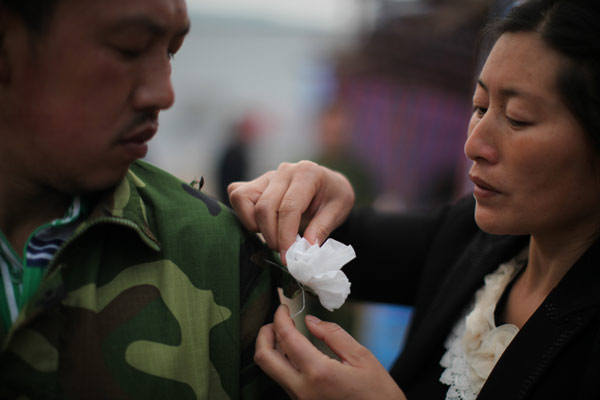 |
|
A woman pins a paper flower on her husband's sleeve on Saturday in Renjia village, Qingren township, in Sichuan province's Lushan county, to pay respect to those who died in the earthquake. Wang Jing / China Daily |
Li's 42-year-old wife and 9-year-old daughter died on April 20, when the magnitude-7 quake jolted Lushan and its neighboring counties. It caused the deaths of at least 196 people, with 21 missing.
"It's the natural disaster that claimed your lives, so please don't blame us," one of Li's relatives murmured at the graveside.
Sichuan government, meanwhile, made Saturday a day of condolence. All entertainment activities were banned and three minutes of silence were observed from 8:02 am, while vehicle and ships' horns were blown and the air-strike warning wailed.
Li was working at a construction site when the quake started at 8:02 am. The nearby bridge shook, but he ignored the danger and immediately rushed home over the bridge.
"I knew that my daughter must be sleeping because it was the weekend," he said.
But when he arrived, his three-room house built in 1991 was a pile of ruins.
From his 86-year-old mother he learned that his wife escorted his mother out of the house first, when the quake struck. But she was buried by the collapsed ceiling when she returned to rescue her sleeping daughter.
"Neighbors helped me carefully remove the wood ceiling and we were hoping my wife and daughter had survived," he said.
Nine people in Li's village died in the quake. Five of the victims were elderly and could not run away, commented Zhu Jinren, a village official.
Most of the village's old houses were completely destroyed, while newly built structures were fractured, Zhu added. "We must support each other and be strong," the village official said to villagers when they gathered to mourn on Saturday.
Li said he cried uncontrollably at the scene of the disaster and called his son, Li Lin, who studies at Xichang College.
On April 21, the second day of the quake, his son arrived home. "We hugged and cried," Li said.
With the help of relatives, Li and his son buried his wife and daughter the same day. "It was raining so we did not pile much earth onto the graves."
Despite his grief, Li volunteered to help others and transported relief materials for the village government, setting up tents and patrolling to maintain social order.
"By keeping myself busy I tried to set aside my sadness. The deceased have left us, and we survivors must continue and stay strong," Li said. "It's not easy to forget but we have to face the reality and restart our lives."
His son plans to find a part-time job as a swimming coach for the upcoming semester.
"My mom and sister have passed away, and I now have a stronger sense of duty for the family," Li Lin said. "We need to face up to the suffering of life."
"I am a stranger to most of my fellow college students," he said of those students in his college who made donations. "But they were very generous."
The government has provided bottled water and instant noodles for village residents and they have all been given tents to live in.
The central and provincial government has provided a total of 1.51 billion yuan for rescue work, the provincial government said on Saturday.
Everyone in the quake-hit region received a subsidy of 10 yuan and 0.5 kg of grain per day from the government since Thursday.
In addition, the civil affairs authorities have provided more than 87,000 tents, 233,000 quilts, and 3,393 tons of food to the affected region.
A week after the temblor, telecommunication services, water supplies and temporary accommodation have been provided in most of the quake-hit region. But electricity was still out in some rural areas as of Saturday.
For Li Shaohua, besides the grief of losing his wife and daughter, he now has to contend with the problem of how to survive himself.
"We have nothing now," he said. "Even my wife's body was laid in my mom's coffin."
Most Viewed
Editor's Picks

|

|

|

|

|

|
Today's Top News
13 killed, dozens injured in Mexico prison riot
China, EU 'to renew ties'
Life goes on after Lushan earthquake
TEDA inks investment agreement with Egyptian govt
Industries post lower profit growth
China, EU agree to beef up cooperation
China's court hears Jordan suit
Top charitable donor list published
US Weekly

|

|

